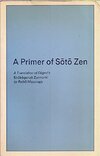

Auf ein Miniaturbild klicken, um zu Google Books zu gelangen.
|
Lädt ... A Primer of Soto Zen : A Translation of Dogen's Shobogenzo Zuimonkivon Eihei Dogen
 Keine Keine aktuelle Diskussion zu diesem Buch.   ) )This is a wonderful little book that deserves to be sipped rather than swallowed. Admittedly, this was my first exposure to Dogen but it was enough to inspire me to read more. At times the rigor of dedication this book demands for anyone seeking the Way exceeded my interests (leave everyone I know and strip myself down to a life of poverty and single-minded dedication to studying the Way? No thanks). That being said, there is much in Dogen's view to be contemplated and adapted so that a balanced life of American style Zen study can be at least imagined. I definitely recommend this book but only to those already familiar with Zen meditation and an established practice. This is a wonderful little book that deserves to be sipped rather than swallowed. Admittedly, this was my first exposure to Dogen but it was enough to inspire me to read more. At times the rigor of dedication this book demands for anyone seeking the Way exceeded my interests (leave everyone I know and strip myself down to a life of poverty and single-minded dedication to studying the Way? No thanks). That being said, there is much in Dogen's view to be contemplated and adapted so that a balanced life of American style Zen study can be at least imagined. I definitely recommend this book but only to those already familiar with Zen meditation and an established practice. Zen was popularized in the West largely through the writings of Dr. D.T. Suzuki, who followed the school of Rinzai Zen. Although it remains relatively unknown in the West, Soto Zen eventually attracted the greatest number of followers in Japan. With its gentle, more intellectual approach, Soto Zen relies on deep meditation (zazen) rather than the "sudden," direct method (using koan) of Rinzai Zen, in striving for enlightenment. The Shobogenzo Zuimonki consists largely of brief talks, horatatory remarks, and instructional and cautionary comments by the Soto Zen Master Dogen (1200-1253). Translated, shobogenzo means "the eye of the true law." Roughly translated, zuimonki means "easy for the ears to understand," or "simplified." Zeige 5 von 5 keine Rezensionen | Rezension hinzufügen
Gehört zu Verlagsreihen
Zen was popularized in the West largely through the writings of Dr. D.T. Suzuki, who followed the school of Rinzai Zen. Although it remains relatively unknown in the West, Soto Zen eventually attracted the greatest number of followers in Japan. With its gentle, more intellectual approach, Soto Zen relies on deep meditation (zazen) rather than the "sudden," direct method (using koan) of Rinzai Zen, in striving for enlightenment. The Shobogenzo Zuimonki consists largely of brief talks, horatatory remarks, and instructional and cautionary comments by the Soto Zen Master Dogen (1200-1253). Translated, shobogenzo means "the eye of the true law." Roughly translated, zuimonki means "easy for the ears to understand," or "simplified." Keine Bibliotheksbeschreibungen gefunden. |
Aktuelle DiskussionenKeineBeliebte Umschlagbilder
 Google Books — Lädt ... Google Books — Lädt ...GenresMelvil Decimal System (DDC)294.3927Religions Other Religions Religions of Indic origin Buddhism Buddhism - Branches and schools Mahayana Buddhism Zen BuddhismKlassifikation der Library of Congress [LCC] (USA)BewertungDurchschnitt: (4.06) (4.06)
Bist das du?Werde ein LibraryThing-Autor. |
||||||||||||||||||||||||||||||||||||||||||||||||||||||||||||||||||||||||||||||||||||||||||||||||||||||||||||||||||||||||